| Srl | Item |
| 1 |
ID:
187407


|
|
|
|
|
| Summary/Abstract |
On 31 October 2021, an agreement was signed between Antigua and Barbuda and Tuvalu that established a commission with the power to request an advisory opinion from the International Tribunal for the Law of the Sea (ITLOS). Since ITLOS’s advisory jurisdiction has been tested in only one case, I explain and evaluate the procedural obstacles facing this commission, as well as the potential questions it might submit to ITLOS. The analysis draws upon the jurisprudence of the International Court of Justice to indicate how ITLOS could articulate and apply its jurisdiction in an advisory case. I conclude that although there appear to be few insurmountable obstacles to securing ITLOS’s jurisdiction, care must be taken by the Commission of Small Island States on Climate Change and International Law to ensure that the questions presented to ITLOS are carefully drafted so that ITLOS has no concerns over the judicial propriety of giving an advisory opinion.
|
|
|
|
|
|
|
|
|
|
|
|
|
|
|
|
| 2 |
ID:
158328
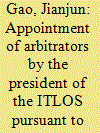

|
|
|
|
|
| Summary/Abstract |
The authority vested in the President of the ITLOS by article 3 of Annex VII to the LOS Convention to appoint arbitrators for the Annex VII arbitral tribunal is important for the effective operation of the dispute settlement system established by the LOS Convention as well as for the ITLOS itself. There are some apparent irregularities in the practice of the President so far, and the transparency of the appointment process needs to be enhanced.
|
|
|
|
|
|
|
|
|
|
|
|
|
|
|
|
| 3 |
ID:
118138
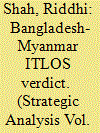

|
|
|
|
|
| Publication |
2013.
|
| Summary/Abstract |
The International Tribunal for the Law of the Sea (ITLOS) is a body set up under the United Nations Convention on the Law of the Sea (UNCLOS) to deal with disputes that emerge because of a difference in the interpretation and application of the convention. 1 Bangladesh has had an ongoing maritime boundary dispute with India and Myanmar since 1974. On 14 March 2012, the ITLOS delivered a verdict and ended the long-running maritime boundary dispute between Bangladesh and Myanmar.
In the current global world, energy resources are a crucial element for a nation's growth. India, Bangladesh and Myanmar are no different in this regard. India discovered 100 trillion cubic feet (tcf) of gas reserve in the Bay of Bengal (BoB) in 2005-2006. Soon after, Myanmar discovered seven tcf of gas reserves near the Rakhine coast. This discovery of colossal gas reserves sparked a claim-staking contest between the three countries in the BoB.
|
|
|
|
|
|
|
|
|
|
|
|
|
|
|
|
| 4 |
ID:
118192
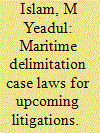

|
|
|
| 5 |
ID:
131371
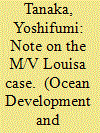

|
|
|
|
|
| Publication |
2014.
|
| Summary/Abstract |
In the M/V "Louisa" case of 28 May 2013, the International Tribunal for the Law of the Sea held that it had no jurisdiction, even though it had established prima facie jurisdiction at the provisional measures stage. The M/V "Louisa" case thus gives rise to questions regarding the relationship between prima facie jurisdiction and jurisdiction on the merits. Moreover, the M/V "Louisa" Judgment also sheds some light on the applicability of the doctrine of abuse of rights provided in Article 300 of the UN Convention on the Law of the Sea.
|
|
|
|
|
|
|
|
|
|
|
|
|
|
|
|
| 6 |
ID:
109199
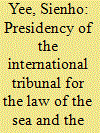

|
|
|
|
|
| Publication |
2011.
|
| Summary/Abstract |
The functions of the President of the International Tribunal for the Law (ITLOS) of the Sea are three-dimensional: the President is a normal international judge, an organizational leader and a judicial leader in a particular case. The Presidency is a powerful one, perhaps more so than that in other international judicial bodies, and can be a platform for the "national State extension" vice-the President's possible partiality towards his or her national State-to take effect. Several antidotes or safeguards exist to combat this, including the relatively short term of office, the judicial solemn declaration and the efforts to equalize the parties by ensuring "national representation" on the Bench in a case, and the principle of separation of functions and the disqualification of the national President as President but not as Judge. However, uncertainties remain regarding the timing and scope of the application of the principle of separation of functions and disqualification of the national President. The context of the ITLOS Statute and Rules and the good administration of justice militate in favour of an early trigger point at the time when a particular case is first presented to the Tribunal and the widest scope possible for the application of the principle to cover a situation where the national State of the President is not a party but is in the same interest or substantially in the same interest as a party in a case, including the situation where, though not factually connected, the non-party national State of the President and a party share a legal position that is decisive in the case. Finally, the paper suggests that, as a further antidote, the possibility be considered of requiring a presidential solemn declaration (separate from and in addition to the judicial one) or revising the current judicial declaration to encompass presidential functions.
|
|
|
|
|
|
|
|
|
|
|
|
|
|
|
|
| 7 |
ID:
142288
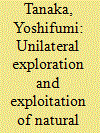

|
|
|
|
|
| Summary/Abstract |
Unilateral exploration and exploitation of natural resources in disputed marine areas create a sensitive issue in the context of maritime delimitations. In the Ghana/Côte d'Ivoire dispute concerning maritime delimitation, Côte d'Ivoire requested that the Special Chamber of International Tribunal for the Law of the Sea (ITLOS) prescribe provisional measures to suspend all ongoing oil exploration and exploitation operations conducted by Ghana in the disputed area and to refrain from granting any new permit for oil exploration and exploitation there. In the Order of 2 April 2015, the Special Chamber declined the Côte d'Ivoire's request to prescribe the suspension of operations but did order that Ghana ensure that no new drilling either by Ghana or under its control take place in the disputed area. The Ghana/Côte d'Ivoire Order sheds light on the legal consequence of unilateral exploration and exploitation of natural resources in disputed marine areas.
|
|
|
|
|
|
|
|
|
|
|
|
|
|
|
|